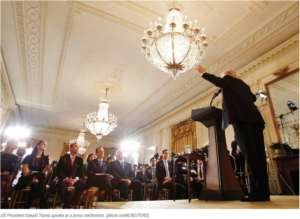
Canceling The Live White House Press Briefings – Right Move or Not?
The Jerusalem Post
By Stan Steinreich
Why isn’t this White House using the briefing or even the old fashioned press release to promote real news? Why aren’t they setting the pace of the news cycle like other administrations in the past?
There has been a lot of journalistic discussion about the White House’s latest move to better control its message by bringing about dramatic change in the format of the daily press briefing. I agree with the two former press secretaries (Republican Ari Fleisher and Democrat Mike McCurry) who agree with the move to drop the live broadcast for several reasons.
The intended goal of the daily press briefing is to provide a forum for the White House press secretary to share information about events and actions within the administration and the administration’s reactions to news around the globe. However, it has morphed into a parody of itself.
We all watched daily as Sean Spicer squirmed trying to guess the answers to questions that would be supported by his unpredictable boss. This skewering became more entertainment rather than offering actual news value.
We only need to look as far as NBC’s Saturday Night Live, which turned the daily sparring match into a weekly sketch. When Sarah Huckabee Sanders stepped up to the podium, there was a bit more order in the room, but hardly much more substance.
Maybe we can learn something from Israel and the access journalists have to government figures. Journalists in Israel, like those everywhere, always want more access, but let’s put that discussion aside for the moment. The point is that the Prime Minister’s Office, and even the President’s Office, do so much more with so much less.
There is no daily press briefing in Israel, yet news is disseminated throughout the day and the spokespeople for both offices field hundreds of media inquiries in the same time frame. The spokespeople themselves even have time to appear on camera in interviews. Yet, there are far fewer Kellyanne Conways making appearances for the prime minister.
Israel may execute a better strategy, because it better understands the nuts and bolts of the journalistic process. That said, daily access to our government leaders is a pillar of democracy worldwide and should be taken more seriously.
The media in the United States has a literal seat at the table, with journalists from major news organizations having desks in the West Wing. Many journalists with offices around the nation’s capital are credentialed to cover the White House. The large press department within the White House is there, ready and able to handle each journalist’s inquiries and facilitate their work.
None of that has changed with the change from daily broadcasts, nor has the daily press briefing itself. Journalists can still use the press briefing to ask their questions if they wish, only they won’t have the ability to try to embarrass press secretaries on national television.
They needed to do away with the “gotcha moment” and to remember what journalists are there for – to get the news in order to better inform their readers and viewers. I remember one of my journalism professors who so correctly quipped, “There is no such thing as a bad question, only bad answers.”
The Trump administration’s problem is its relations with the media. The administration tends to take more of a defensive posture when it comes to sharing information, and more of an offensive one when it comes to oratory. Why isn’t this White House using the briefing or even the old fashioned press release to promote real news? Why aren’t they setting the pace of the news cycle like other administrations in the past?
The US government, and even this administration, do wonderful things every day. We don’t see these stories, because I believe they are too busy hunkered down denying conspiracy theories and not devoting enough time, effort, and energy toward promoting real news.
Added to the issues between the Trump administration and the media is his personal Twitter account, which he’s used to share his personal opinions and to launch attacks on the media, most recently with CNN and Mika Brzezinski and Joe Scarborough of MSNBC’s Morning Joe.
There are many things I disagree with and some I even agree with regard to the Trump administration. I don’t advocate the random Twitter rages and I never sanction taking individuals – journalists or not – to public task. No one should have to endure that treatment.
The daily press briefings should not become one of the spectacles that shift our focus away from the far more important issues affecting our world and I agree that the right thing to do is to stop the live broadcasting of the daily meeting.
Stan Steinreich is president and CEO of Steinreich Communications, an international public relations firm with offices in New York, Tel Aviv, London, Los Angeles, Washington, Frankfurt and High Point, North Carolina.


